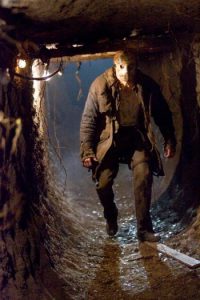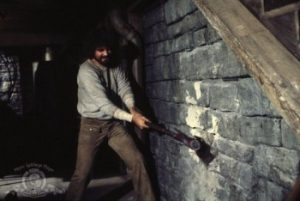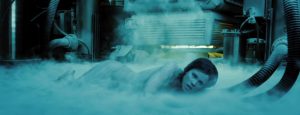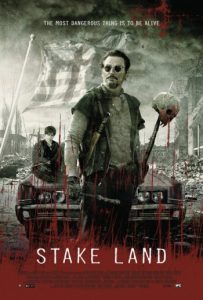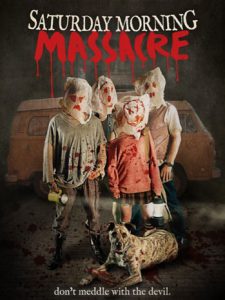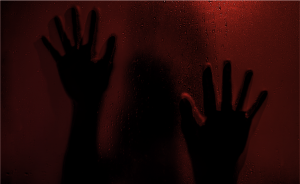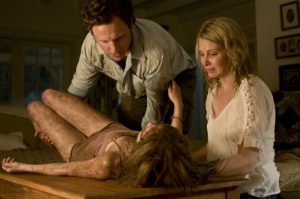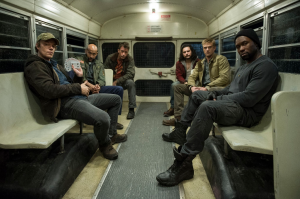The 8 Best Serial Killer Movies Since SEVEN
Director David Fincher and screenwriter Andrew Kevin Walker created a milestone with their 1995 masterpiece Seven, a film that turned the conventional approach to the serial killer film on its ear.
In the wake of Seven, the standard procedural plot of detective characters piecing together clues, identifying, pursuing and eventually capturing or killing the psychotic murderer would no longer be satisfying for admirers of this horror subgenre.
The following 8 films made around the world in the years following Seven successfully created fresh takes on the horror genre’s most modern and human monster.
The films are in chronological order by year of release.
Cure (1997, Japan)
Screenwriter/director Kiyoshi Kurosawa delivers a creepy, very deliberately paced tale of mind control and murder in the first of his multiple collaborations with veteran actor Koji Yakusho from Alejandro Gonzalez Inarritu’s Babel (2006) and Takashi Miike’s 13 Assassins (2010) among many other films.
Yakusho plays a police detective investigating a series of murders that share the same methods but are committed by different people. As the investigation goes deeper, Yakusho’s character connects all the killings to a young man with no apparent memory of the crimes.
Cure is a thought-provoking film with the same type of Andrei Tarkovsky-style pacing Kurowasa employed in his highly regarded and badly remade 2001 horror film Kairo (aka Pulse). As such, the accomplished and challenging Cure is definitely not for the horror film dilettante.
The Crimson Rivers (2000, France)
Actor turned screenwriter/director Mathieu Kassovitz and novelist Jean-Christophe Grange teamed up to adapt Grange’s book about a pair of detectives investigating brutal murders in an isolated mountain town.
Incorporating touches of giallo and dripping with atmosphere courtesy of the outstanding French cinematographer Thierry Arbogast, The Crimson Rivers features the unforgettable pairing of Jean Reno and Vincent Cassel as the detectives and culminates in a great mountainside climax.
Regrettably, a horrendous sequel was produced in 2004, this time with Reno but without Kassovitz, Grange or Cassel.
H (2002, South Korea)
In his first and only feature film, screenwriter/director Lee Jong-hyuk takes a more conventional approach as he explores territory similar to Kiyoshi Kurosawa’s Cure. That’s not to say that H isn’t compelling, though.
The film is anchored by a great lead performance from Yum Jung-ah (best known for playing the stepmother in Kim Jee-woon’s A Tale of Two Sisters (2003)) as a detective teamed up with a new partner to investigate a series of murders targeting pregnant women that continues after the killer turns himself in and is imprisoned.
A lesser-known gem of the South Korean film industry boom that started in the late 1990’s, H deserves to be discussed more frequently despite its flaws.
The DVD for the film contains 2 very memorable deleted scenes that were needlessly and absurdly cut out of the film-the first a gruesome introduction to the killer as he surrenders himself to police and the second an action-packed introduction to Yum Jung-ah’s character’s new partner.
Tattoo (2002, Germany)
Screenwriter/director Robert Schwentke is today best known as the hired gun helmer of Hollywood films like Flightplan (2005), Red (2010) and R.I.P.D. (2013). The highly accomplished low-budget genre film that put him on the cinematic map is the heavily Seven-influenced Tattoo.
The film features excellent performances by August Diehl and Christian Redl as a pair of detectives investigating a string of killings involving victims who are skinned in the process of having their elaborate body tattoos removed.
Sadly, Tattoo has never had the proper North American DVD release that this atmospheric, too little-seen film deserves.
Empire of the Wolves (2005, France)
Screenwriter/director Chris Nahon and The Crimson Rivers author Jean-Christophe Grange tackle another of Grange’s novels with the screenwriting aid of Christian Clavier, Franck Ollivier, Luc Bossi and Simon Michael.
Despite concerns that too many screenwriting cooks will spoil the creative broth as frequently happens in American studio films, Empire of the Wolves emerges as an excellent, overlooked film.
Nahon and his team start the film with a younger detective pairing up with a disgraced former cop to look into a string of murders targeting female Turkish immigrants.
As their investigation takes the duo into the Turkish criminal underworld, the film expands beyond the typical confines of the serial killer subgenre and enters suspense thriller of acquired identity territory as it connects its murder investigation plot with the parallel story of a woman who starts to question her memories.
The film, beautifully shot by cinematographer Michel Abramowicz, features one of legendary French actor Jean Reno’s finest performances as the ex-cop Schiffer.
The Killing Gene (aka Waz, 2007, UK)
Underrated director Tom Shankland, who went on to make the great “killer kids” horror film The Children in 2008, brings screenwriter Clive Bradley’s film noir-influenced screenplay to life with highly memorable results in The Killing Gene.
Shankland and Bradley succeeded in making a film about a morality-based killer that’s far more gripping and thought-provoking than James Wan and Leigh Wannell’s overrated, poorly directed, series-spawning Saw.
Veteran international actor Stellan Skarsgard turns in one of his career-best performances as a detective with dark secrets who teams up with another investigator played by Melissa George in the wake of a series of murders with a connection to Skarsgard’s character’s past.
Like several other films mentioned in this article, The Killing Gene is too-little discussed.
I Saw the Devil (2010, South Korea)
Director Kim Jee-woon and screenwriter Park Hoon-jung inject real freshness into the serial killer subgenre by crafting a tale of revenge with unique twists in the vicious and brutal I Saw the Devil.
Lee Byung-hun plays a government agent in pursuit of a serial murderer superbly played by Choi Min-sik of Park Chan-wook’s Oldboy fame.
The director and screenwriter may have originally intended the film to portray Lee Byung-hun’s character drifting toward becoming the kind of soulless monster he’s pursuing as indicated by the famous Nietzche quote about fighting monsters shown onscreen at the beginning of the film.
Despite this intention, I Saw the Devil is not Friedrich Nietzche, it’s pure Charles Darwin as two killing machines go head to head in the ultimate game of survival of the fittest highlighted by some incredible, nerve-shredding fight sequences.
A gripping film that goes in unexpected directions, I Saw the Devil is a must-see.
A Horrible Way to Die (2010, USA)
Amy Seimetz plays the traumatized ex-girlfriend of a serial murderer who has recently escaped prison and is traveling across the country on his way toward her, leaving a trail of bodies in his wake.
Directed by Adam Wingard and written by Simon Barrett, the creative team behind segments of V/H/S (2012), V/H/S 2 (2013) and The ABCs of Death (2012) along with the highly regarded home invasion film You’re Next (2011), A Horrible Way to Die is an underappreciated gem made with very little money.
While the acting and makeup effects unfortunately fail to hit the mark during various portions of the film, the real star here is the clever screenplay by Simon Barrett that confounds audience expectations and produces a very fresh take on the subgenre.
The intentionally shaky camera work might be disconcerting for some viewers but A Horrible Way to Die is an outstanding film despite the clearly limited resources available to the filmmakers.



